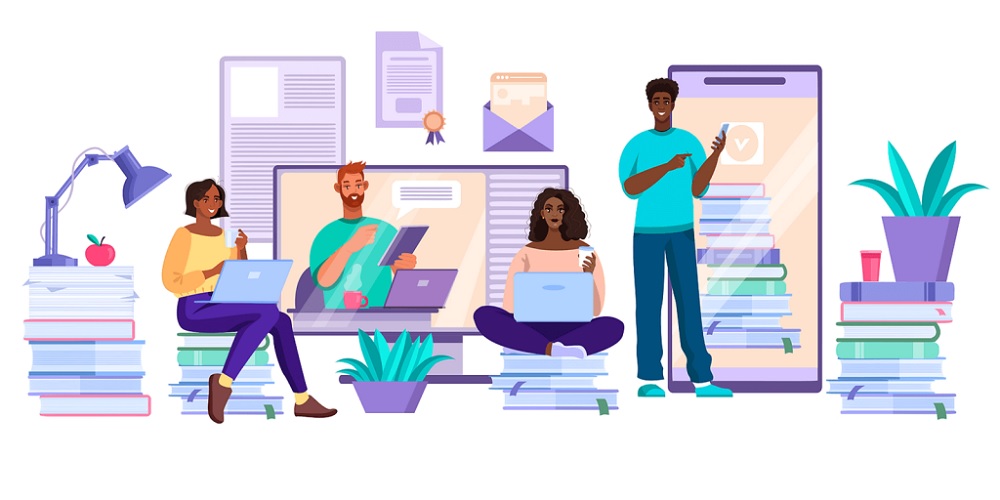This guide will help you easily navigate authoring tools and e-learning assessment best practices. You can use your authoring tool to create assessments, put knowledge checks and quizzes throughout your content, and take advantage of new technology and strategies.
Use an Authoring Tool to Create E-learning Assessments
Authoring tools give you an easy interface to make professional assessments. First, most authoring tools come with various templates to choose from. For example, Articulate has pre-made templates that you can simply add your own content and media assets to. These are professionally designed and ready to go as soon as you put in your course materials, saving you the time and hassle of worrying about your level of design expertise. Or, you can build a custom template to use throughout your course.
Second, using an authoring tool enables you to create many different types of e-learning assessments. These can include multiple choice, short answer, or scenarios, to name a few. Evaluate the different types, and determine what will be right for your content and audience and what will help learners achieve the course objectives.
Finally, ensure that you are testing your content and e-learning assessment. While using an authoring tool will help minimize any issues, it’s still good practice to ensure that everything is working the way that it’s supposed to. Testing will keep future help desk tickets low and help learners have a great experience.
Knowledge Checks vs Assessments
It’s important to note the difference between assessments and knowledge checks. Both are great for creating an exceptional learning experience. Knowledge checks are low-pressure tools that can improve comprehension. However, knowledge check data is usually not reported, whereas assessment and quiz data can be recorded and reported to the LMS. Still, knowledge checks can help you improve learning outcomes and build learning comprehension into a course.
Assessments not only to test the learner’s knowledge but also enable you to gather necessary data. However, it is crucial to ensure that the data from quizzes and assessments can be reported to the LMS. Be sure to build in proper assessments to test your student’s understanding of the course materials.
Using knowledge checks and quizzes or assessments in tandem offers a better e-learning experience and will drive student motivation and understanding.
Take Advantage of Improvements in Technology and E-learning Strategies
One of the newest and best improvements in learning strategy is gamification. Turning e-learning assessment into a game is a fun, low-stress way to assess a learner’s knowledge. By making course content more engaging, learners remember course content more easily.
Another new e-learning technology is virtual reality, or VR. It is becoming more common, and the technology is getting more and more accessible. VR is an especially powerful asset for immersive, hands-on training in specialized industries.
Regarding strategy, qualitative testing can improve the effectiveness of your e-learning content. The difference between qualitative testing and traditional methods is simply that you are focusing on determining the quality of a learner’s comprehension as opposed to the quantity of learning content available. A move to qualitative testing “identifies and helps with soft skills, decision-making, [and] applying solutions to real-life problems.” Using this method ensures that you are providing the highest quality e-learning education to your clients.
Best Quiz Options
- Quizmaker 360 from Articulate: Easy quiz tool that can be used to make a standalone assessment or be part of a larger course
- iSpring: Standalone quiz maker with powerful options and insightful reports
- Adobe Captivate: Part of Adobe’s powerful authoring tool with many assessment options
- Firmwater QTI: Built-in assessment tool that comes free when using Firmwater LMS; supports all standard question types, can incorporate feedback, and has built-in reporting specific to the tool to analyze learner responses
Conclusion
Follow these simple e-learning best practices to create high-quality assessments in your content. First, if you harness the power of an authoring tool for creating assessments, you will exponentially improve your content quality. Second, use knowledge checks along with traditional quizzes and testing in your content to help increase student comprehension and motivation. Finally, be sure to take advantage of any new technology or e-learning assessment strategies. These improvements will lead to happy clients and a successful training business!
Here at Firmwater, we don’t just sell an LMS for training providers. We partner with our clients, giving them the tools and insights they need to implement the best practices in e-learning course development, growth, and delivery. We care too much about our customers’ businesses to have them wade through forums and chatbots for help.
Ready to use an LMS that’s designed for the way YOU work, with a team dedicated to YOUR needs? Book a no-obligation consultation directly with our team today!


